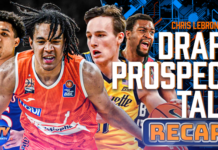The New York Knicks battled into overtime to earn a win over the Charlotte Hornets 118 to 109.
New York appeared to have the game under control throughout the first half, getting off the fast start and never letting go of their lead. The Hornets managed to fight back behind big games from two bench pieces, Devonte Graham and Miles Bridges. The Knicks’ defense all but vanished for a chunk of the third quarter, reappearing only with Nerlens Noel’s presence.
The fourth quarter saw New York forced to come from behind early, and then Charlotte fight back to tie the game late. The Knicks didn’t score for the final 4 minutes of regulation. It wasn’t until overtime that the Knicks’ found their offense again behind a series of three-pointers assisted by none other than Julius Randle. Derrick Rose, Alec Burks, and IQ all added helpful scoring from the bench. It was a hard-fought win; the Knicks outlasted their opponents. Let’s take a look at how New York regained control of its destiny in the playoff seeding.
Randle’s triple-double and Bullock’s sharpshooting lead the Knicks starters
Elfrid Payton: Elfrid Payton’s struggles continued, though they weren’t as pronounced as against San Antonio. Julius Randle’s hot start and a third-quarter hook before the defense collapsed meant that Elf had a quiet 12 minutes without standing out on the bad side. His minutes dipped again, but this time it came down to first-half foul trouble. The starting point guard didn’t get many touches to work with, and his defense was back to respectable.
Elf managed 2 points, 2 assists, and 2 rebounds on 1/3 shooting in 12 minutes. He missed his only three-point attempt. The starting point guard spent far more time watching other players orchestrate than getting chances to work himself into a rhythm. There were hot hands all over, and Payton’s lack of three-point shooting means he can’t take advantage of Randle’s gravity like other perimeter players. Elf was present and working, but there were better options off the bench. He needs the ball to be effective, but there are too many on-ball options playing well right now. Hence Payton comes in below impact grade minutes for a second consecutive game.
Reggie Bullock: Reggie Bullock was red hot to start this game. He unleashed a barrage of early three-pointers that set the tone for New York’s shooters the rest of the way. Clyde remarked that Bully fades as games move on, and that proved prophetic. The shooter’s performance dipped on offense for most of regulation. Bullock did come through with a big three-pointer in overtime, though.
Bullock played 40 minutes and put up 17 points and 6 boards on 6/12 from the field and 5/9 from three. His 2-point field goal was also a jumper, a pump fake to one dribble, and a pull-up. The 3 and D wing lived up to his billing, canning three’s on the catch and shoot for most of his offense. He didn’t do much else, but that’s because he didn’t have to; the jumper was lethal enough.
Clyde did bring up a good point. Bully starts games hot but tends to taper off. I think that’s because teams start to close out more and more as Bullock knocks down more jumpers. Reggie’s a low-maintenance player; he gets his points off simple actions that a defense can address with added attention. The real value from Bullock’s quiet moments is when Randle gets an isolation because defenders can’t leave shooters open anymore. So even when Bullock’s quiet, his impact is still looming. Reggie Bullocks grabs a 3 out of 5 for great shooting to open things up for everyone else.
RJ Barrett: RJ Barrett found his minutes cut despite playing a solid game through three quarters. New York’s bench unit had enough success on the perimeter to warrant Tom Thibodeau looking in other directions for crunch time execution. It’s both an easy decision to question and one that’s difficult to argue with since the Knicks got a win. RJ was a quality ball mover and solid scorer. He hit his only long-range look and was creative off the dribble. The break in minutes may prove helpful for game two of a back-to-back, though.
Barrett only spent 27 minutes on the floor, shooting 4/10 from the field and 1/1 from three to the tune of 9 points, 4 assists, 4 rebounds, 1 block, and 2 turnovers. There are two more notables stats; he didn’t attempt a free throw and picked up a technical foul. Those two are intertwined. Barrett wasn’t a great finisher inside, but he took a LOT of contact without ever being rewarded. His complaints drew the ire of refs early on and did nothing to change the manner he was officiated. I think the 9-God had a valid gripe. Players were all over his arms on any trips inside.
Barrett’s production and efficiency are both solid for 27 minutes. They’re not second option numbers, but with the way possessions were shared, that makes sense. The playmaking is enough to smile at RJ’s production, especially with an understanding that he probably deserved a couple less FGA’s and a few trips to the charity stripe. The sophomore scores a 2.5 out of 5 for his solid game and rare night of extra rest.
Julius Randle: Julius Randle started the game on fire, scoring and passing his way through a Hornets defense that gave way too many isolated opportunities to the star. Randle had it going with his jumper and on drives until late in the game when his isolations became too one-note. He found a remedy by taking the ball to the racket and using his gravity to free up shooters in overtime. That adjustment set off a chain reaction of three-point makes and ball movement, which defined New York’s overtime dominance.
Randle played 46 big minutes, pumping in 33 points, 13 assists, 10 rebounds, 1 steal, and 4 turnovers. The big man shot 12/25 from the field, 4/10 from three, 5/8 from the free-throw line. It’s scary that Randle was the only starter to attempt a free throw, and for the second game in a row, he’s the only player to earn many free throws at all. His shooting numbers would be even more impressive had he not gone into iso-Melo mode late in the fourth. The Knicks need a new approach to late-game possessions. Let Randle set the screens or act off of some different action because the high pick and roll is scouted and addressed every time.
The numbers speak for themselves, don’t they? Randle was a dominant force, the difference-maker in a closely fought contest. His presence made the offense run and provided some relief at the line that no one else provided. The big man’s passing tends to spark everyone else, and that was clear in the first quarter and overtime. At this point, the only thing to say is that Randle needs to be an All-NBA selection. He’s earned it. Randle gets a 5 out of 5 for dropping a triple-double and taking over this game.
Nerlens Noel: Nerlens Noel was already having a good game when Cody Zeller pissed him off in the third. But angry Noel took it to another level, swatting a series of shots in quick succession before taking a brief breather. The shot blocker’s absence only served to make his impact clear; the Knicks defense collapsed without him. New York’s momentum and second-half defense only appeared while Noel was out there, and his impact continued into overtime.
Noel put up 8 points, 11 rebounds, 2 steals, and 5 blocks in 34 minutes on 4/5 from the field. He spent overtime creating second-chance points with a series of tip-outs and disruptions. The Knicks’ offense received plenty of opportunities to create thanks to the extra effort under the boards. Passers fed Noel without the typical fumbles that we’ve grown accustomed to. That meant he was able to convert a couple more baskets along the way as well.
Noel saved one of his best performances for this key match-up. His interior presence disrupted a Hornets offense that was successful whenever he sat. My only complaint is that Noel settled for reaching at steals a bit too often. The only time Charlotte beat the big man inside was when they caught him with his hands low, poking at the ball instead of denying the shot attempt. Other than that, the big man was a force that only grew after Zeller ironically kicked the hornet’s nest. Noel gets a 3.5 out of 5 for his game-changing defense and board work.
Second unit guards add a scoring punch
Derrick Rose: It’s hard to call 15 points off the bench quiet. But Derrick Rose has been so brilliant recently that his performance felt like a step back from the utter dominance of recent weeks. That’s not to take away from his game, though. Rose was unstoppable when he chose to attack and whipped some beautiful passes for assists along the way. He threw a head fake dime to Immanuel Quickley in the second quarter that was near perfection. The only thing keeping him from a bigger impact was an early trip to the bench in the fourth quarter after tough contact on defense.
Rose’s quieter performance still meant 15 points, 3 assists, 1 rebound, and 2 turnovers. He shot 6/9 from the floor, 1/2 from three, and 2/2 from the free-throw line. His production wasn’t down because of poor play, just fewer minutes. With Burks and IQ closing out the game, D-Rose was able to settle into a smaller piece of the pie without the team feeling ill effects…actually, I’m not so sure that’s true. When New York couldn’t score during the final four minutes of action, I was begging for Thibodeau to get Rose back out there.
The former MVP didn’t turn back the hands of time for his return from a brief injury break. But New York didn’t need the Prince of Persia this game. Rose provided an early spark and hit some important shots before other players took the baton and brought this one across the finish line. He was all quality in the minutes he played and continues to be a crucial piece of the Knicks’ puzzle. Rose grabs a 3.5 out of 5 for his quality performance.
Alec Burks: Fourth quarter Burks was a mixed bag, but Alec Burks turned in a catalytic overtime with his shooting and forays inside. Burks was good for putting strain on the Hornets defense by getting inside or pulling jumpers against soft closeouts throughout the game. His playmaking popped as well, with Burks flashing improvements in drive and dish situations lately. The scorer’s timing isn’t always great on passes, but he’s looking for cutters and starting to complete the dimes. Add the playmaking threat to Burks’ scoring ability, and he was able to spell Derrick Rose in a manner that we haven’t seen from other perimeter players.
Burks put up 14 points, 5 assists, 9 rebounds, and just 1 turnover in 30 minutes. He shot 5/12 from the floor, 2/7 from three, and 2/2 from the free-throw line. Burks didn’t have his three-ball off the dribble, which prevented him from truly exploding as a scorer. But that didn’t prevent him from feeding others without throwing the crazy passes we’ve seen in some recent games. The bench scorer is starting to show more PG chops. That could spell rotation changes if he’s able to keep up the lofty assist to turnover ratio he pulled off in this game.
I’ve harped on the rebounding before, but Burks’ 9 boards are important. New York gave up 15 offensive rebounds; second-chance points were a legitimate threat to their success. Burks was a machine on the boards, creating a few loose balls in addition to his own tally. With his rebounding and playmaking beginning to pop more often, the scorer is becoming much more than that title suggests. Alec Burks finishes with an impact score of 4 out of 5; he was a closer again.
Immanuel Quickley: Immanuel Quickley got off to a torrid pace with his scoring. The rookie knocked down jumpers or went to the free-throw line in the early going. He scored more than a point per minute for his first 10 minutes of action. The rookie fell back to more of a floor spreading role while Burks and Randle worked late, but I’d have liked to see him get more opportunities on the ball during fourth-quarter offensive struggles for New York. Regardless, his quality play meant that IQ got extra minutes in crunch time of the important victory.
In 24 minutes, IQ added 13 points, 1 assist, and 2 rebounds. He shot 4/8 from the field, 2/6 from three, and 3/3 from the free-throw line. It was helpful that he drew free throws on his first three-point take. Quickley hasn’t been as lethal from range since returning from an ankle injury, but it’s only been two games. The rookie is already starting to find his rhythm again. I also like that his one assist came to fellow rookie Obi Toppin. The youth has chemistry that we’ll enjoy more of as they grow together.
Quickley’s performance was promising as can be. He provided a scoring spark early and acted as a crucial spacer while Randle and Burks attacked inside. Thibodeau split up the trio of Rose, IQ, and Burks to close this game out, and I’ve spent all season claiming that they work better in pairs…so I liked that. Quickley is already a perfect compliment to any lead ball-handler thanks to his shooting and ability to get inside. His defense and playmaking both show enough promise that I’m more excited about his upside than most. IQ gets a 3 out of 5 for steadily helping New York succeed.
Obi Toppin: Obi Toppin had another short night thanks to Julius Randle balling out of his mind. Toppin only got 7 minutes to make things happen. It was a relatively quiet outing, though he did convert a key three-pointer. Toppin wound up going 1/1 for 3 points and a block, giving Julius Randle just enough of a break to keep up his dominant play. It feels like Obi is ready for a bigger role, but that’s hard to earn when a star player is holding down those minutes.
Taj Gibson: Taj Gibson had a solid, if forgettable night. He hit a drop step on Terry Rozier that made me chuckle. Gibson’s always good to hit us with some classic moves. The big man played his typical brand but wasn’t as effective as Noel in rim protection. That meant that Gibson’s minutes marked the Hornets’ best offensive runs, although it wasn’t Taj’s fault. Devonte Graham shot lights out; then his gravity opened up Miles Bridges.
Gibson played 18 minutes and managed 4 points, 5 boards, and 1 assist on 2/3 from the field. It’s a solid bench contribution without being anything more. He turned in a good effort. There’s not a whole lot to complain about. I just don’t have much to highlight either.
The beauty of Thibs’ front-court rotation is that its big men play a humble and workman-like style. That means that when one player has it going, the other guy can take a step back and cede minutes without questions arising. Nerlens Noel was dominating this game inside, so Taj Gibson took a step back. That doesn’t mean Gibson’s effort waned or was bad in any way. Taj gets a 2 out of 5 on his impact grade, perfectly fine for less than 20 minutes off the bench.
Frank Ntilikina: Frank Ntilikina got a defensive substitution late again, but it was weird. He came in for a play or two, not even clocking a minute played, and he was utilized on a fourth or fifth option. I guess he was out there to be a help defender, but he was pulled out of the play and guarding a far baseline. Not the most useful place for the team’s best perimeter defender.
Tom Thibodeau continues marching to his own beat and winning along the way
Tom Thibodeau: Tom Thibodeau got some players breaks. He loaded 46 minutes on Randle and 40 on Bullock, but both RJ Barrett and Derrick Rose were spared big minutes in an overtime match-up. That seemed strange as ball movement all but died in the late fourth quarter. But now the Knicks have 40 wins with RJ and Rose fresher for the finale against Boston. The unique closing unit for this game had all the appeal of a JR Smith “no, no, no…swish” attempt. I panicked the entire time it was out there, but it looks great in retrospect.
Thibs had some other interesting decisions. He mixed and matched his backcourts in several ways that helped keep everyone in rhythm. That’s a luxury the perimeter depth affords him. I liked choosing to stick with two out of his three bench ball handlers for a larger chunk of the game. The trio can work, but pairing off helps clarify that they need to be aggressive. Nerlens coming back in early was an obvious decision but a good one. The coach’s only mistake was another shoddy use of the challenge.
Tom Thibodeau doesn’t always do things the way that I would expect. For his reputation as a technical type, Thibs coaches on instinct quite a bit. He rides hot hands sometimes until they go through cold spells and then get hot again. He encourages an aggressive approach that makes everyone a threat. That’s how five of eight players who logged more than 15 minutes wound up in double-digits. Thibodeau is different, and that’s just fine because it gets results. Tom Thibodeau gets a 4 out of 5 for a well-coached victory.
Closing Thoughts
This is it. The Knicks defeated the Hornets and have one game left before we embark on the postseason. Add to that, the Heat lost to the Bucks and fell behind in the standings. That means that New York’s final game against the Boston Celtics will decide whether they finish a fourth seed or sixth. The Knicks have played incredible basketball all season long, and now they control their fate one last time.
It’s only right that the 40th win didn’t come easy. New York has been scrapping to victory all year long; why should the final couple of games be any different? Their identity is obvious, and we’re just along for the ride at this point. “Next man up” doesn’t only refer to how New York has dealt with injuries. When they hit the court, players pick each other up and step up as needed. There’s a trust that permeates every player in the rotation. It’s special to witness after seeing so many teams play selfish basketball. It’s refreshing.
The Celtics are next for the finale, and they come in with a lot of injuries and no more ground to gain with a win. This should be a chance for New York to close on a high note, but tired legs might loom in the back-to-back. I think it will be Rose and RJ’s turn to step up big, but it can be anybody with this crew. I’m looking forward to watching New York play for extra games in the Garden and one last chance to talk about a win before we venture into the playoffs. See you after the game, Knicks fam!
Stay tuned to knicksfantv.com for the latest Knicks news, recaps and rumors as the playoffs approach!









